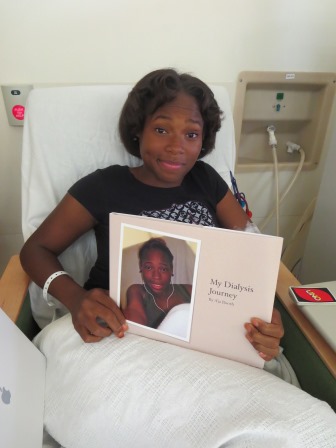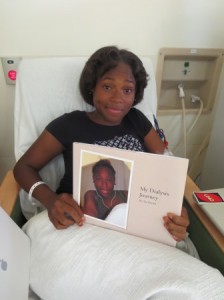
 As a 12-year-old girl in 2009, A’ja Booth remembers being healthy but worried when she was waking up feeling bloated and swollen. She thought she had food allergies.
As a 12-year-old girl in 2009, A’ja Booth remembers being healthy but worried when she was waking up feeling bloated and swollen. She thought she had food allergies.
Testing at the Children’s Hospital of Michigan, part of the Detroit Medical Center, showed she had a serious kidney disease called focal segmental glomerulosclerosis (FSGS). FSGS is a disease in which scar tissue develops on the parts of the kidneys that filter waste out of the blood (glomeruli). It can be caused by a variety of conditions. Without treatment, FSGS may lead to kidney failure where the only treatment options are dialysis or kidney transplant.
Tej Mattoo, M.D., chief of Nephrology and Hypertension and director, Renal Transplant Program, on staff at the Children’s Hospital of Michigan, says unfortunately A’ja did not respond to traditional treatment, including medications that reduce the amount of protein in the urine or treatment that suppresses the immune system.
Dr. Mattoo who served as principal investigator for a national research study on new treatment for FSGS funded by the National Institutes of Health (NIH) and the National Institute of Diabetes and Digestive and Kidney Diseases (NIDDK) says treatment can be challenging for those with the disorder.
“More than half of such patients progress to permanent renal failure, and they run a risk of recurrence of the disease in a transplanted kidney.”
A’ja developed kidney failure and required life-saving dialysis treatment for four years until a kidney donor could be found.
To help A’ja cope with her treatment, she received visits from Jenny Fox, art therapist, who is part of the Child Life staff at the Children’s Hospital of Michigan. Child Life services offer support such as music and art therapists to help children cope with their emotions, adapt to new physical restrictions after trauma and find comfort in safe, calming distractions during treatment.
According to Jenny, at first it was hard for A’ja to open up and talk about what she was going through. Jenny thought A’ja may enjoy working on a photo book that would chronicle her journey through treatment and provide a unique perspective on her thoughts and emotions through pictures and words.
“Taking photographs and using A’ja’s own words to describe it was a nonthreatening way for her to safely communicate through images what was going on in her treatment. It provided her with the power and control she needed to express herself and her journey,” Jenny says.
A’ja decided to share her photo book with friends and others at school and it caught the attention of her health teacher Nadirah Muhammad.
That encounter led to the life-saving kidney transplant A’ja was waiting for.
“After seeing the photo book I told A’ja I would be willing to donate my kidney to her if I was a right match,” Nadirah says.
The amazing offer from A’ja’s teacher turned into a life-saving gift. Nadirah was a perfect match to be a donor.
“Her operation went smoothly. Her donor’s kidney anatomy was not straightforward, and required extra work after the kidney was removed from her donor (her teacher) in order to make sure the new kidney received excellent blood supply throughout. The great news is that the kidney had immediate kidney function, which is the case for greater than 97% of all living donor kidney transplants we perform at the Children’s Hospital of Michigan,” says Dean Y. Kim, M.D., chief, Transplant Services, on staff at the Children’s Hospital of Michigan.
A’ja, says she feels healthy and fortunate that she has a new lease on life.
“I feel very blessed that Nadirah donated her kidney so I can be healthy. I plan to use this gift so that I may help others who might be in a similar situation.”
In fact, A’ja is hoping to get her photo book published so that it may help other kids who are on dialysis and waiting for a transplant. She is also hoping to pay it forward by enrolling at Oakland University after high school and attending nursing school to help other kids.
For further information on kidney disease, kidney transplant and child life services visit www.childrensdmc.org.
